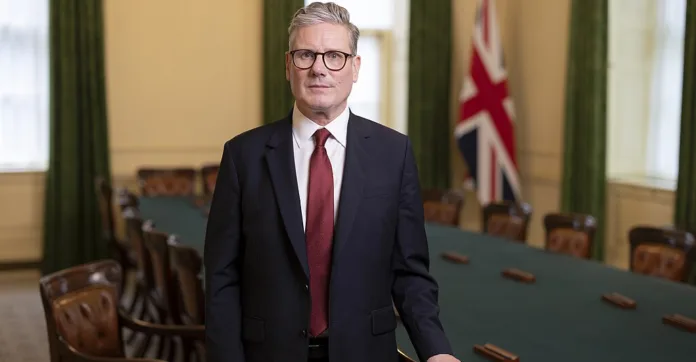Nearly 500 arrested as unrest follows Southport stabbings; prime minister calls for continued vigilance
Prime Minister Sir Keir Starmer has called for a heightened police presence across the UK as the nation continues to grapple with escalating far-right violence. The call for vigilance comes in response to a series of violent incidents and widespread unrest triggered by the tragic stabbing of three young girls in Southport last Monday.
Starmer issued his appeal during an emergency Cobra meeting, his third such gathering since the violence erupted. The National Police Chief’s Council reported a significant number of planned events for the day, including 20 riot-related gatherings and three counter-demonstrations. Thousands of officers remain on standby, ready to respond to any further disturbances.
Embed from Getty ImagesThe Southport stabbings, which claimed the lives of three young girls, have been a catalyst for the violent unrest that has swept through Britain. The violence has led to the arrest of 483 individuals so far. Among those apprehended are John O’Malley, 43, and William Morgan, 69, who were sentenced to two years and eight months each for their involvement in the far-right riots in Merseyside.
In addition to these arrests, Metropolitan Police Chief Sir Mark Rowley conducted early morning raids aimed at apprehending individuals linked to the rioting. These raids followed anti-racism protests held earlier in the week, highlighting the broader tensions and the need for sustained law enforcement efforts.
The far-right violence has caused significant disruption and has sparked a nationwide debate on race, immigration, and social cohesion. The protests and riots have affected various communities and have drawn responses from political figures and local authorities. Amidst the unrest, London Mayor Sadiq Khan has expressed personal concerns for his safety as a Muslim politician, underscoring the widespread impact of the violence on different communities.
The Independent
Prime Minister Keir Starmer has called for heightened police vigilance following a series of violent incidents across Britain, with nearly 500 arrests linked to far-right riots ignited by the Southport stabbings. During his third emergency COBRA meeting since the violence began, Starmer commended the police for their quick action and called for continued preparedness amid ongoing unrest.
The National Police Chief’s Council reported 20 planned riot-related events and three counter-gatherings for today, with thousands of officers on standby. The recent violence, including attacks on hotels housing asylum seekers and mosques, has led to 483 arrests. Key figures involved in the disorder have already been sentenced, including John O’Malley and William Morgan, who received prison terms for their roles in the Merseyside riots.
In related news, London Mayor Sadiq Khan expressed his fears for his safety as a Muslim politician amidst the escalating violence, highlighting the personal and societal impact of the recent events.
The Guardian
In his analysis of the recent far-right riots in Britain, Larry Elliott argues that while the immediate response from authorities is necessary, it does not address the deeper economic and social issues fueling the unrest.
Elliott highlights that the violence, which has shocked many but not entirely surprised observers, is symptomatic of broader societal problems. The riots have damaged Britain’s international reputation, with warnings issued by several countries about travelling to the UK. This unrest is not just about isolated incidents of rioting but reflects deeper, systemic issues.
The economic landscape in Britain, marked by significant regional disparities and stagnant wages, has created fertile ground for far-right extremism. Elliott notes that places suffering from economic neglect, such as Rotherham and Stoke-on-Trent, have been more severely affected by the violence. These areas, hit hard by deindustrialization and austerity, face high levels of poverty and unemployment, exacerbating social tensions.
The current unrest also reflects a broader dissatisfaction with the political and economic system. Despite promises of improvement, many communities feel abandoned and betrayed by successive governments. This disenchantment has led to a volatile mix of frustration and anger, with some turning to far-right ideologies as a form of expression.
Elliott emphasizes that while punitive measures against rioters are important, they are insufficient on their own. Addressing the root causes of the unrest—such as economic inequality and social discontent—is crucial for long-term stability. The challenge for the government is to tackle both the symptoms and the underlying issues that have led to the current crisis.
